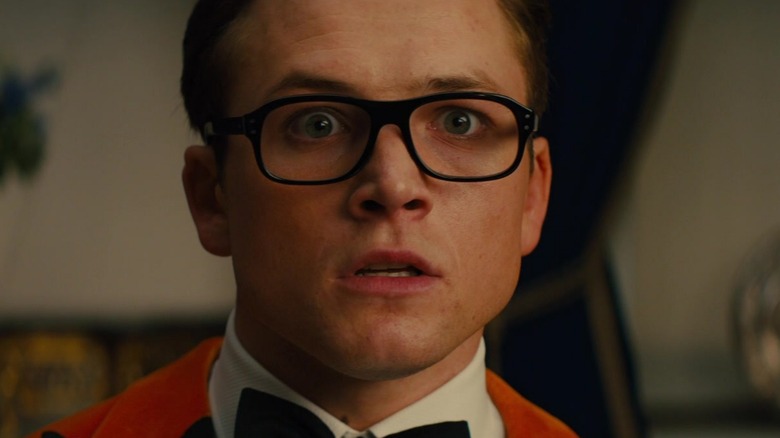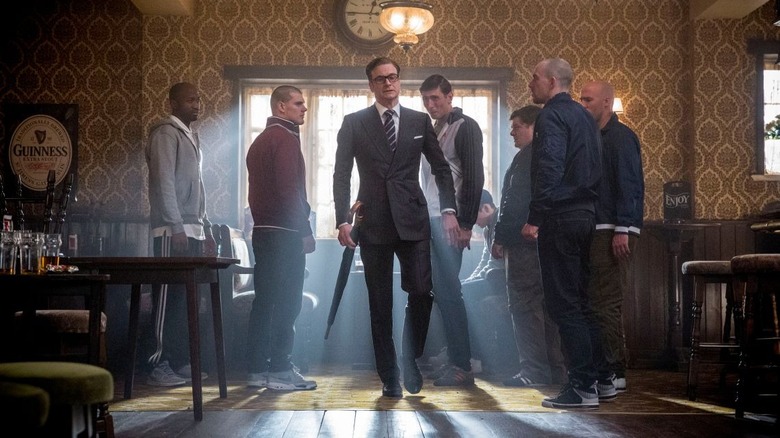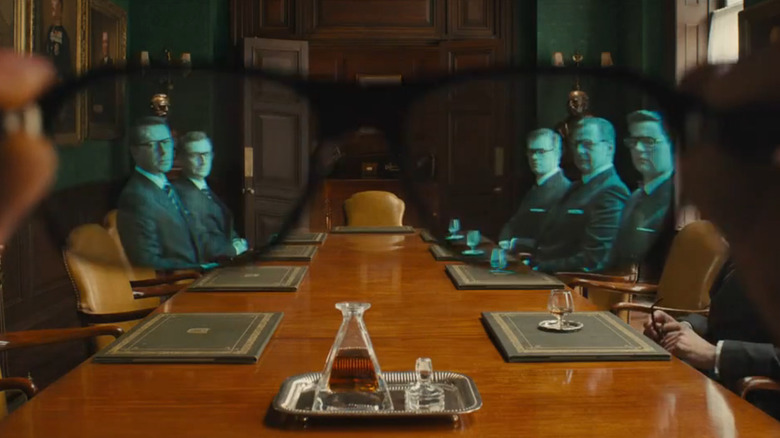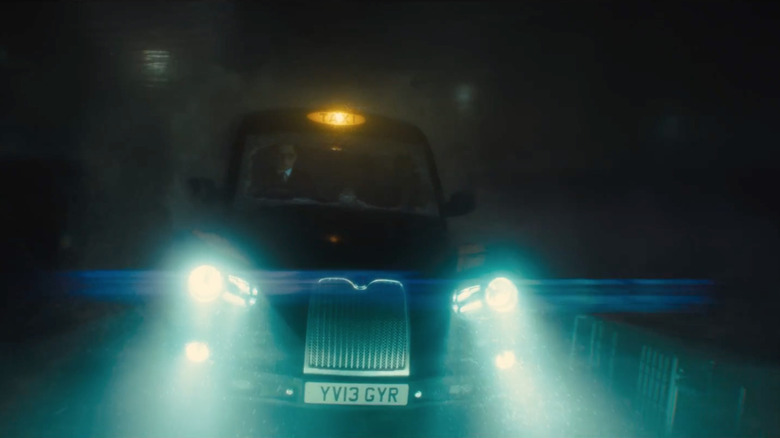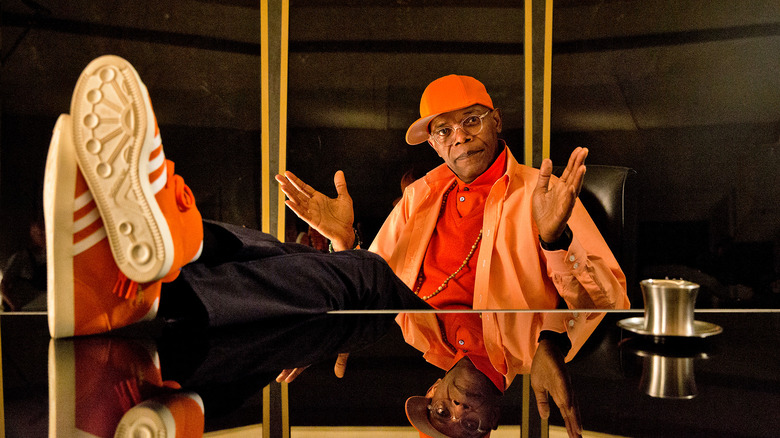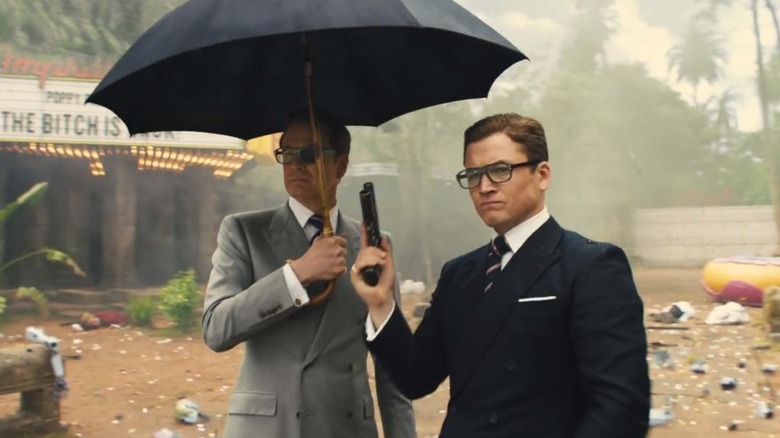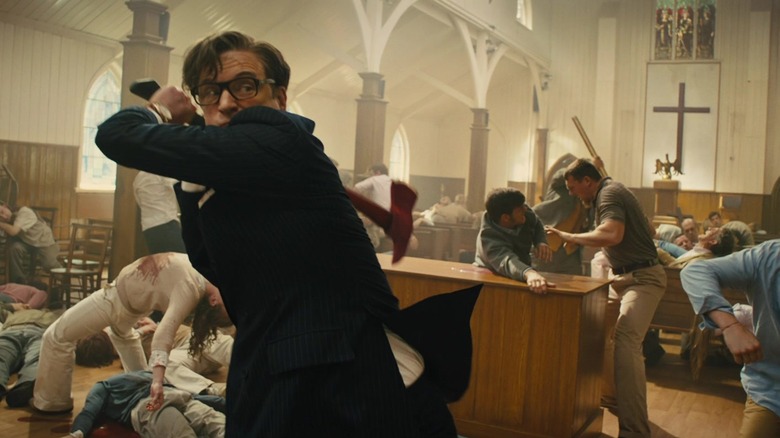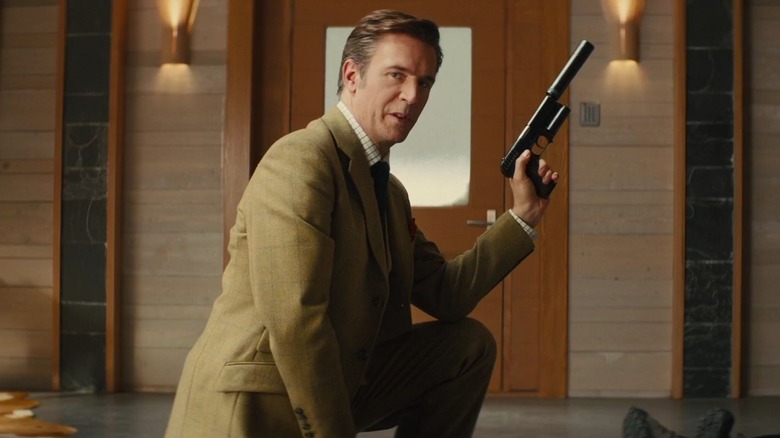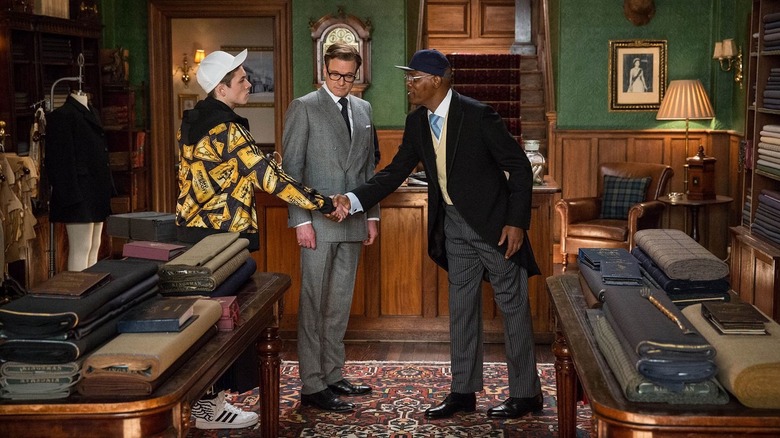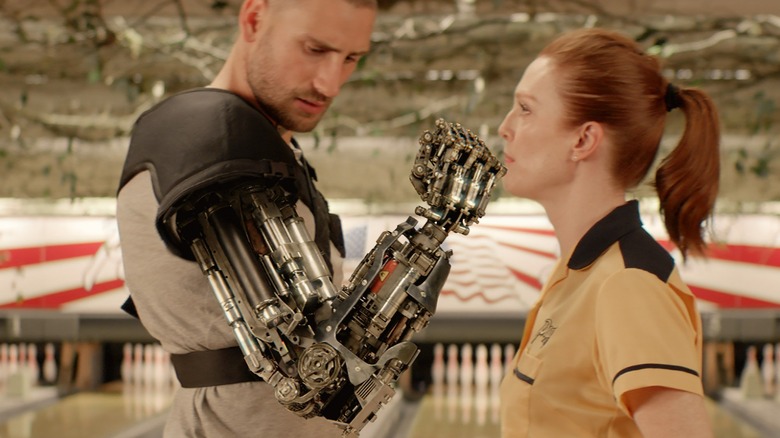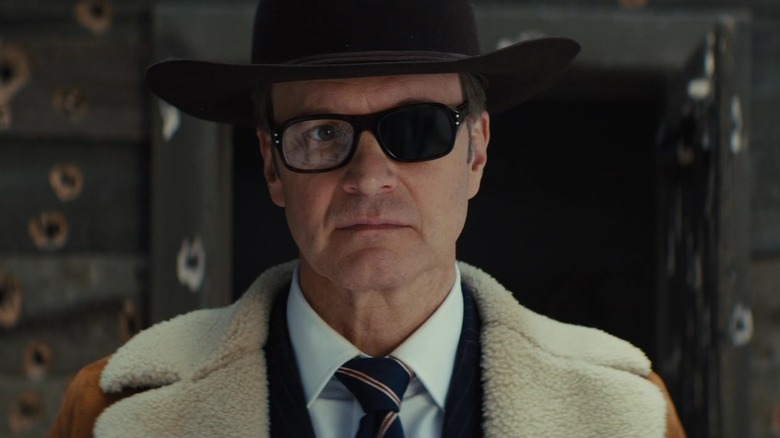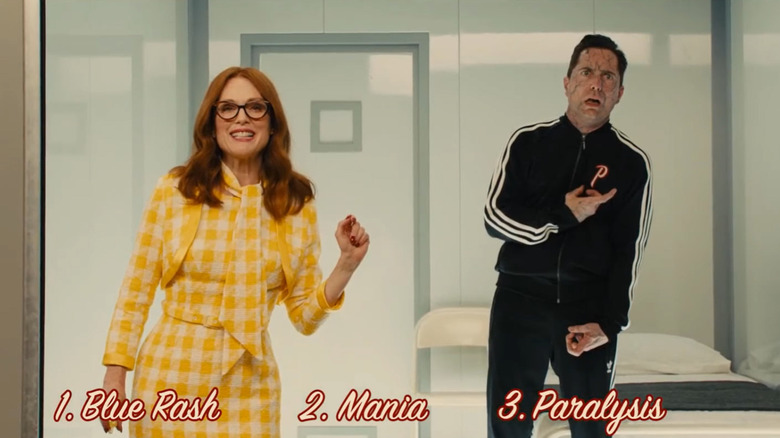Things That Happen In Every Kingsman Movie
The early 2000s saw the emergence of "gritty" and "realistic" spy movies. Following the example set by "The Bourne Identity," the "James Bond" and "Mission: Impossible" series also started gearing towards more grounded storytelling. In 2014 the pendulum swung the other way around once again with Matthew Vaughn's "Kingsman: The Secret Service," based on a comic series by Mark Millar and Dave Gibbons.
As gloriously over-the-top as the most campy Bond films, "Kingsman: The Secret Service" tells the story of Gary "Eggsy" Unwin (Taron Egerton), an uncouth lower-middle-class youth from London who is inducted into a secret society of spies masquerading as tailors. The movie was a big hit at the box office, which naturally meant a sequel followed in 2017, titled "Kingsman: The Golden Circle," continuing Eggsy's journey into the secret world of international spies.
After that, the "Kingsman" films headed back into the past for a 2021 prequel simply titled "The King's Man," which explored the origins of the Kingsman society during the time of the First World War. While the "Kingsman" franchise continues to expand further, the three movies in the series that have been released so far bear certain similarities in terms of style and story beats. Let us take a look at stuff that happens in each "Kingsman" movie.
Manners maketh man
If there is one creed the Kingsman service members seem to live by, it is to always appear polite and well-behaved in front of friends, enemies, and everyone else. This proves particularly challenging to Eggsy in the first movie, since he grew up in much more foul-mouthed surroundings and was used to cursing like a sailor.
His mentor, Harry Hart (Colin Firth), showed Eggsy that a man can be polite and still forceful. Before taking on a bunch of bar flies who were messing with Eggsy in the first movie, Harry remarks, "Manners maketh man," before proceeding to beat the tar out of the whole group. This impresses Eggsy enough to compel him to join the Kingsman under Harry's personal tutelage.
In the second movie, Harry says, "Manners maketh man," before another bar fight as a callback to the first film, although this time the brawl does not end in his favor. In the prequel movie, audiences discover that "Manners maketh man" was a line uttered by the villainous Captain Morton (Matthew Goode) to the lead character Orlando Oxford (Ralph Fiennes). Orlando then decided to make the line a founding principle of the Kingsman society he would one day create.
Elaborate spy gadgets
True to its comic book and "James Bond" parody roots, the world of the "Kingsman" features a whole host of preposterous gadgets used by the main characters in their missions. One of the niftiest pieces is the umbrellas issued to each Kingsman, which can double as bulletproof shields, guns, or simply dressy additions to the sharp suits worn by members of the club.
Then there is the lighter which is secretly a hand grenade, which Harry uses in his fight against the members of a church in the first movie. A signet ring worn by each member can be used to give a massive electric shock to enemies. Let us also not forget the shoes worn by the Kingsman, which can extend a deadly blade when the heels are tapped together.
In the prequel movie, the gadgets are less futuristic, in keeping with the idea that the story takes place during a less scientifically advanced time. You see a lot of unusually shaped guns and bayonets, but most of the classic Kingsman gadgets are only seen briefly in the end, when Orlando forms the organization. "Espionage back then, they've got a carrier pigeon with a f***** note on its thing," the film's director, Matthew Vaughn, said in an interview reported by CinemaBlend while explaining the lack of new gadgets. "So that, that was a [high-tech] way of communicating secretly."
References to other spy movies
One reason the "Kingsman" movies work so well is that they are built upon the remains of a classic "spy movie" era that audiences are already extremely familiar with. Instead of trying to distance itself from the genre, the franchise wears its inspirations proudly on its sleeve with a lot of references to James Bond and other spy film iconography.
The first "Kingsman" movie has Eggsy mentioning that his dog's name is JB, which makes the other character ask if the initials stand for James Bond. At one point Harry Hart talks to the main villain, Richmond Valentine (Samuel L. Jackson), about the latter's love for old-fashioned spy movies, and there is even a tongue-in-cheek reference to how the villains in those movies tend to monologue endlessly instead of simply executing their enemies.
The second movie features Eggsy driving a car that doubles as a submarine that feels ripped straight out of Pierce Brosnan's era of "Bond" films. In the third movie we see the lead character Orlando Oxford performing many stunts previously done by Bond, such as climbing a mountain with improvised gear ("For Your Eyes Only"), letting an enemy fall to his death who had been holding on to his necktie ("The Spy Who Loved Me"), and fighting a henchman who is much larger than his fellow hench-folk.
An over-the-top villain
You can't be an international spy in Hollywood films if you are not on the trail of some dastardly villain with plans to wreak havoc on the world. Old-school spy movies always had villains who were threatening the stability of the entire planet, and the "Kingsman" franchise stays true to that idea with a coterie of gleefully over-the-top main villains.
First up in "Kingsman: The Secret Service," we have Richmond Valentine, a tech billionaire with a prominent lisp and a desire to cull the human population before it overwhelms the resources of the planet. Valentine has an elaborate scheme to compel people all over the world to slaughter each other at his command using radio signals. The second movie has the painfully sweet Poppy Adams (Julianne Moore), a drug mafia queen who wants to hold the world hostage using a new and poisonous kind of drug.
"The King's Man" has no need to devise a freshly elaborate, world-ending scheme since it takes place during World War I. Instead, the main villain of the movie is shown to be working behind the scenes to bring about the culmination of the war with massive civilian casualties unless he can be stopped by Orlando Oxford and his team of pre-Kingsman allies.
Lots of fancy suits
The first thing audiences noticed about the Kingsman agents in the first movie was that, in an era when spy heroes were all about practical clothing and scruffy fashion choices, the Kingsman agents made it a particular point to always be dressed to the nines in formal gear. This tracks with the backstory of the organization, as it was born from an influential group of tailors.
The suits that Kingsman agents wear are not just for show, but they're practical as well. Although it is hard to imagine how the agents are able to move around in the suits comfortably enough to execute all their acrobatic fight scenes, the fights almost always end with the agents still dressed impeccably, with only their hairstyles in disarray to show they had recently been involved in strenuous exercise.
"The King's Man" sees the progenitors of the spy agency also dressed in faultless formal wear from that era, although the clothes are noticeably more baggy than their modern counterparts, with a military edge since the movie takes place during a time of war. Fans of the franchise were delighted to learn that the Kingsman tailor organization is inspired by a real-life company in London called Huntsman that specializes in creating tailored suits for their clientele.
Gory action scenes
In keeping with its fondness for over-the-top theatrics from a bygone era in spy movies, the "Kingsman" franchise also has a larger-than-life approach to its action scenes. Instead of secret agents putting henchmen to sleep with a neatly-placed karate chop to the neck, the Kingsman agents often take part in entertainingly gory, epic, prolonged fights.
The most memorable of these scenes occurs in "Kingsman: The Secret Service," when Harry Hart finds himself trapped alone in a church with a mob of ultra-violent lunatics. Harry has no choice but to deliver a brutal beatdown that includes stabbing limbs, point-blank headshots, using the Bible as an unholy weapon of blunt force trauma, and skewering enemies like shish kebabs. Then, there is the end of the movie, which has a bunch of heads exploding in unison.
The second movie has Poppy Adams ordering one of her henchmen to dump the other into a meat grinder and then eating a sandwich containing meat from said grinder. The poison drug Poppy uses also ends people's lives in visually gory ways. Finally, "The King's Man" has the main villain defeated after his leg is skewered by a vengeful goat, not to mention a giant henchman getting his entire head sliced off with one swift stroke of a sword.
Lots of black humor
The "Austin Powers" series is generally considered the funniest spoofs of "James Bond"-style spy movies ever made. But the "Kingsman" franchise also has a legitimate claim to that title. While not straight parodies, the "Kingsman" movies feature lots and lots of black humor to leaven all the graphic violence and world-ending stakes.
The most famous example of this occurs in the first "Kingsman" movie, when Harry Hart goes into a church and brutally murders a bunch of innocent civilians who are being mind-controlled. The main villain also has a lisp he uses while laying out his plan to kill off most of humanity, subverting the typical image of a homocidal "Bond" villain he's modeled on. The second movie has a ruthless villain who likes to feed her own men into a meat grinder and lays out her plans for world domination from a lair modeled after '60s era memorabilia.
Even "The King's Man," while being a more serious prequel set in more realistic surroundings, has its own share of black humor. Early on, the main villain executes a random goat to make a dramatic point. In the end, the villain is defeated when another goat stabs him in the leg as revenge for the previous killing of its comrade.
Lancelot dies
The Kingsman organization is composed of a set of agents codenamed after characters from King Arthur's court. One of the most prominent names among the agents is "Lancelot." Unfortunately, a dark shadow hangs over that title, spelling death for whoever is unfortunate enough to become the organization's Lancelot.
In "Kingsman: The Secret Service," the very first agent we meet is James Spencer (Jack Davenport), who bears the Lancelot codename at the time. After a spirited fight scene, Spencer meets his demise in a brutal fashion when his body is cleaved in half from top to bottom. After that, the main character Eggsy comes close to becoming the new Lancelot, but his friend Roxy (Sophie Cookson) is given the title instead.
In "Kingsman: The Golden Circle," Roxy also meets her end when the main villain sends a missile straight to her home. In "The King's Man," even before the agency was founded, Orlando's son Conrad (Harris Dickinson) gives himself the nickname "Lancelot." Sure enough, Conrad dies in the middle of the film after being mistaken for a German spy and executed by his fellow soldiers. You would think after so many deaths, the Kingsman would just retire the "Lancelot" codename.
Commentary on the British class system
The central conceit of the original "Kingsman" movie was "What if James Bond was not an upper-class elite, but someone from the lower classes of British society?" In keeping with that premise, each "Kingsman" movie deals with the British class system, which privileges citizens who come from wealth above more working-class folk — which, in the real world, has only gotten more extreme since the first "Kingsman" film was released, as Britain faces a cost-of-living crisis (per NPR).
In the first two movies, this theme is explored through Eggsy, who goes from being an unruly lower-income youth to a Kingsman secret agent. But Eggsy does not forget his roots, and in the second movie, he is seen hanging out with his old friends from his previous social class. A further complication is added in by the fact that Eggsy is now dating a literal princess (Hanna Alström) who expects him to behave like an upper-class dandy during social occasions.
"The King's Man" removes Eggsy from the equation, but the exploration of the British class system remains in the way the main characters come from different strata of society. Also, the main villain of the film wants to create a revolution that will have the lower classes of society rising up against the aristocracy to create a more just and egalitarian world.
Superhuman henchmen
There are times when the "Kingsman" franchise feels more like superhero movies than spy thrillers. And that is because its characters often do things that quite frankly should be impossible to do for ordinary humans. Case in point, the henchmen in the franchise often have some sort of superhuman enhancement or body modification.
The first movie introduces us to Gazelle (Sofia Boutella), a henchwoman whose feet are made of steel swords. Not only do they allow Gazelle to be really fast, but they can also slice a man in half with a single kick. The second movie introduces us to robot dogs, as well as a minor villain (Edward Holcroft) with a robot arm. That arm has great destructive capabilities and is also responsible for hacking into the Kingsman agency's computer mainframe.
"The King's Man" does not have henchmen with metal parts (in keeping with its theme of being set during a less technologically advanced time). But what the movie does have is Grigori Rasputin (Rhys Ifans), established as a henchman of Tsar Nicholas of Russia (Tom Hollander), for the main villain. Rasputin is presented as a larger-than-life figure with superhuman fighting skills and some vaguely defined supernatural powers.
A dramatic headshot
The "Kingsman" franchise is all about a super-secret spy agency that operates in the shadows and has allies and enemies all over the world. Naturally, this provides the perfect excuse for a number of twists and turns that each movie can take. And in each film, one such major twist setting up the third act is signaled by a dramatic headshot scene.
In the first movie, Harry Hart is established as an even more heroic figure than the protagonist Eggsy. After winning a fight against a church full of crazed lunatics, Harry emerges from the building and confronts the main villain, Valentine, only to be shot directly in the eye with a point-blank headshot. In the second movie, Agent Whiskey (Pedro Pascal) is set up as an awesome new ally from the US who helps Eggsy and a newly-resurrected Harry on their mission to stop Poppy Adams.
That is why it is all the more shocking when Whiskey gets taken out with another close-quarters headshot by Harry, who later reveals to Eggsy that Whiskey had been a double agent all along. Finally in "The King's Man," Conrad is set up as the heroic main character at first. But then he is killed via headshot by a fellow soldier, and that kickstarts the main story of Orlando being forced to get back into the war to avenge the death of his son.
A convoluted world-ending plot device
You can't have a super-rich and super-secret spy agency if they are not busy saving the world from major threats. In the "Kingsman" franchise, such threats take the form of convoluted death machines, plot devices that have the potential to kill millions of people around the world if the Kingsman do not stop the baddies in time.
In the first movie, that device was a simple SIM card distributed around the world. Claiming to provide unlimited calls and internet, the cards would emit a neurological wave that drives a person's aggression into overdrive, causing them to kill or be killed by anyone in their immediate vicinity. The second "Kingsman" movie introduces us to a new kind of drug that can kill any person who consumes it after an agonizing waiting period.
"The King's Man" takes a different approach to its world-ending doomsday device. Instead of a device, we get a secret cabal of villainous characters, each with their own criminal specialty, all working together under the guidance of a man named "The Shepherd" (Matthew Goode) who wishes to topple the existing social order in Western countries by secretly attacking specific military and political pressure points across the Western world.
